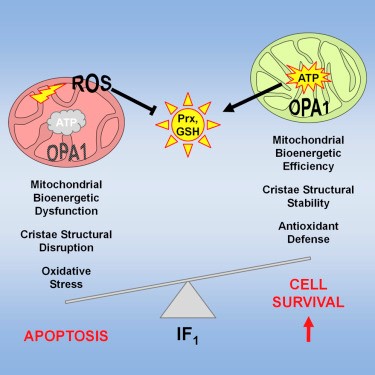Research by the Royal Veterinary College identifies how certain cancer cells resist chemotherapy
Chemotherapy is a drug treatment that uses powerful chemicals to kill fast-growing cells in your body. New research has identified how certain cancer cells resist chemotherapy by creating a protection mechanism. This discovery will now allow scientists to work on how to target these cancer cells for more effective and tailored treatment for patients.

The study, which has been published in the prestigious scientific journal Cell Reports, focussed on ATPase inhibitory factor 1 (IF1), a mitochondrial protein which is expressed in various types of human cancers, and which suppresses programmed cell death (apoptosis), enhancing tumour invasion and chemoresistance. The research group responsible for the discovery was coordinated by Dr Michelangelo Campanella of the Royal Veterinary College (RVC) and included researchers from Kyoto Sangyo University in Japan and the University of Rome TorVergata in Italy. Historically, the scientific literature focussing on IF1 stated that this molecule prevents the consumption of ATP from mitochondria, which are the major cellular source of energy. The study found that IF1, by sparring the consumption ATP, fuels a mechanism of resistance to chemotherapy exploited by cancer cells to evade a chemically induced demise. The hope is that with these research findings, scientists can in future develop IF1 targeting drugs as potential anti-cancer to attack the tumour and increase cancer patients’ survival rates. The experiments were done on human derived cancer cells, meaning the findings can be applied to both the treatment and stratification of animal and human patients pursuing the RVC's mission of leadership in comparative physiology and medicine. Commenting on the study, Dr Michelangelo Campanella said: “This study has successfully established the hierarchy between mitochondrial bio-energetics and structure in cancer cells highlighting ATP as an intracellular oncometabolite. We are confident to have, in this way, unveiled a mechanism of mitochondrial structure preservation through the exploitation of retained energy that tangibly increments our understanding of mitochondria orchestrated strategies of resistance to therapy.”
Notes to Editors For more information please contact: Uche Graves (uche.graves@plmr.co.uk) or Zoe White (zoe.white@plmr.co.uk) Press Line: 0800 368 9520
About the Royal Veterinary College The Royal Veterinary College (RVC) is the UK's largest and longest established independent veterinary school and is a constituent College of the University of London. The RVC offers undergraduate, postgraduate and CPD programmes in veterinary medicine, veterinary nursing and biological sciences, being ranked in the top 10 universities nationally for biosciences degrees. It is currently the only veterinary school in the world to hold full accreditation from AVMA, EAEVE, RCVS and AVBC. A research-led institution, in the most recent Research Excellence Framework (REF2014) the RVC maintained its position as the top HEFCE funded veterinary focused research institution. The RVC also provides animal owners and the veterinary profession with access to expert veterinary care and advice through its teaching hospitals; the Beaumont Sainsbury Animal Hospital in central London, the Queen Mother Hospital for Animals (Europe's largest small animal referral centre), the Equine Referral Hospital, and the Farm Animal Clinical Centre located at the Hertfordshire campus. http://www.rvc.ac.uk

